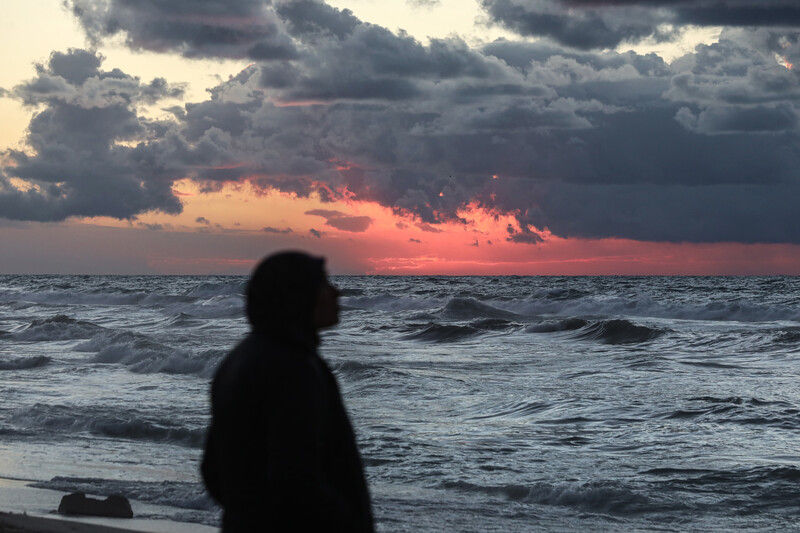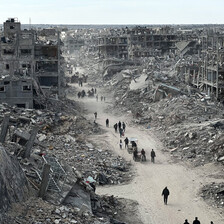The Electronic Intifada 15 January 2025

The sun sets over Gaza on the last day of 2024. The future is a question mark.
APA imagesFor 15 long months, the people of Gaza have endured a brutal genocidal war.
We’ve lost loved ones, homes and any sense of normalcy.
But as talks of a potential ceasefire grow, hope flickers that it might take effect before US President-elect Donald Trump’s inauguration next week.
Our eyes remain glued to our phones, scrolling through news – both real and fake – waiting for the announcement. We long to hear the word “ceasefire” spoken aloud, a fragile sense of relief after all the death we have witnessed.
Reports of progress in negotiations spark fleeting celebrations, with cheers rising from makeshift tents, schoolyards and partially destroyed houses where 1.9 million people – 90 percent of Gaza’s population – have been forced to find shelter.
Yet, as we reflect more deeply on the situation, our faint happiness fades into disillusionment.
While a ceasefire may silence the bombs, it raises a far heavier question: What comes next?
A ceasefire might halt the immediate destruction, but it won’t make Gaza liveable again. Bombed neighborhoods won’t rebuild themselves.
People need homes, schools, clinics, clean water and electricity to begin piecing their lives back together. Beyond that, we need a government that prioritizes its people – one capable of uniting Gaza under a shared vision of progress and dignity.
Without this, even the most well-intentioned reconstruction efforts will falter.
A life liveable?
For those of us who remain barely alive, the future feels like a question mark.
I live in constant fear, haunted by the uncertainty of whether Gaza will ever heal. And honestly, I don’t ask for much – I long for Gaza as it was before the genocide, with all its daily flaws and struggles.
But even that feels like too much to ask. How do you rebuild a home when the very force accused of destroying it holds the keys to its recovery? Will Israel ever allow us to rebuild what it has destroyed – or let us claim our liberty?
I can’t stop thinking about a report the United Nations released back in 2012, titled: “Gaza in 2020: A Liveable Place?”
It outlined a bleak future for Gaza, forecasting immense challenges as the population grew from 1.6 million to an anticipated 2.1 million by 2020. The report warned of critical issues: electricity supply would need to double, the coastal aquifer – our primary source of fresh water – was at risk of irreversible collapse, and tens of thousands of housing units were urgently required.
Looking back on that report now, it feels hauntingly prescient. Yet even its stark warnings could not have imagined the horrors we now face. The report was written long before the 2023 genocidal war that has devastated Gaza beyond recognition. It assumed a Gaza that, while strained, would still exist, still function. It did not anticipate a reality where survival itself would be in question.
Before this war, Gaza endured decades of hardship. For 58 years, we have lived under military occupation, and even after Israel’s withdrawal in 2005, we lived under military occupation by remote, with no power to decide who or what came through our crossings and no control over our own air and sea space.
The 18-year siege that followed turned Gaza into an open-air prison, with basic necessities like food, water and medicine constantly in short supply. Recurring Israeli military assaults further eroded what little stability we had.
And yet, life found a way. Schools opened their doors, markets buzzed with activity and families held onto a life that was ordinary in fragments.
Systematic dismantling
Now, all of that is gone. More than 65 percent of Gaza’s farmland has been destroyed or damaged, leaving families without food or livelihoods. The water crisis has spiraled out of control, with bombed infrastructure cutting off access to clean drinking water for most of the population.
The healthcare system has collapsed. Hospitals and clinics lie in ruins, unable to provide even the most basic care.
Education, once a source of hope, is in tatters. Over 625,000 children have lost an entire year of schooling, and 96 percent of schools are damaged or destroyed.
The economy is obliterated. As far back as January 2024, the World Bank estimated the cost of infrastructure damage at over $18.5 billion. It will be worse now.
Factories, businesses and markets have been wiped out, and over 225,000 homes have been leveled. What remains are overcrowded shelters that are both unsafe and offer no refuge from future destruction.
Sometimes, I wonder: Will we ever stop counting the dead, the destroyed, the displaced? Will I ever stop measuring life in loss? Will those living in fabric-made tent structures ever find themselves beneath real ceilings, surrounded by real walls?
A single minute’s gaze from above or walking the ground in Gaza makes it almost impossible to grasp for hope.
This is not just physical devastation; it is the systematic dismantling of Gaza’s ability to function as a society. The people of Gaza are being stripped of their right to rebuild and dream of a better future.
The challenges in Gaza go far beyond rebuilding what has been destroyed. For those of us living here, the question remains: Who will lead if – or when – a ceasefire happens?
Who will lead?
In May 2024, Israeli Prime Minister Benjamin Netanyahu announced that neither “Hamastan” nor “Fatahstan” would govern Gaza. This leaves one frightening possibility: full Israeli occupation.
Since 2007, Hamas has ruled Gaza, but its control is weakening under massive internal and external pressure. The 17-year blockade that started in 2007, repeated wars – especially the ongoing genocide – and constant military attacks have destroyed its governing infrastructure.
The killing of leaders like Ismail Haniyeh in Tehran and Yahya Sinwar in Gaza have created a leadership gap that seems impossible to fill. Even before this war, many doubted Hamas’ ability to meet our needs. The economic collapse, high unemployment and failing services already caused frustration.
Now, with the ongoing siege and destruction, and should Hamas remain in charge with no international recognition, survival feels almost impossible. Israel continues to block the entry of basic necessities under the same pretexts, while the world refuses to provide aid, labeling Hamas a “terrorist organization.”
The Palestinian Authority is not a better option. Despite international recognition, it has lost the trust of Palestinians due to years of political division, corruption, poor management and dependence on foreign aid.
Many here see the PA as weak and incapable of representing our aspirations for liberty. The PA’s “security operations” in Jenin serve as proof. We will never accept a government that works under Israeli orders, preventing us from food and water while placing its guns in front of our faces – as if the Israeli occupation alone isn’t enough.
Israel’s plans raise profound fears for our future. A permanent military presence and control over Gaza’s security could result in apartheid-like conditions, where we live under direct Israeli rule with severely limited rights, like the West Bank, but worse.
Even more alarming is talk of “voluntary” transfer which seems to suggest the forced displacement of Palestinians from Gaza under unbearable living conditions.
But where would we go? Gaza is our home; leaving would be surrendering a part of ourselves, our identity and our future.
What will become of our history, our culture, our stories if we are forced to leave? Will my grandchildren one day ask me why I let go of the only place that ever truly felt like home?
Petty politics
This war seems to be part of a larger, more systematic plan to make Gaza unmanageable for any Palestinian authority. The isolation of Gaza is deepening as settlement expansion consumes the West Bank, making reunification under one leadership seem increasingly impossible.
Meanwhile, the Abraham Accords have reshaped regional alliances, with Arab countries increasingly turning their backs on the Palestinian cause. These agreements, which normalized relations between Israel and several Arab nations, have further empowered Israel and marginalized Palestinian voices.
It is difficult to accept that these nations, which once stood in solidarity with us, now seem willing to overlook Israel’s continued occupation and violence in exchange for economic and political gain. How can they normalize relations with Israel after all the bloodshed we have endured?
Moreover, attempts to establish a post-war administration in Gaza are paralyzed by internal Palestinian conflict. Palestinian President Mahmoud Abbas’ refusal to accept any shared governance may delay reconstruction efforts and deepen the rifts between Palestinian factions.
At times, it feels as though no one truly cares about the future of Gaza – not even the so-called president.
Abbas’ rejection of any role for Hamas seems rooted in a desire to maintain political control, even at the expense of unity and progress. This power struggle comes at a devastating cost to the people of Gaza, who remain trapped in a cycle of despair. Instead of prioritizing the well-being of the people, political agendas and rivalries dominate the conversation, leaving millions to suffer. The lack of cohesive leadership makes it impossible to rebuild, address the humanitarian crisis or envision a future where Gaza can thrive again.
This war will not end with the last airstrike. Its effects will linger in the rubble, in the struggle to rebuild and in the constant fear that the ceasefire will not last. The people of Gaza need more than words of solidarity. We need meaningful global action to support reconstruction and ensure accountability.
Malak Hijazi is a Gaza-based writer.






Add new comment